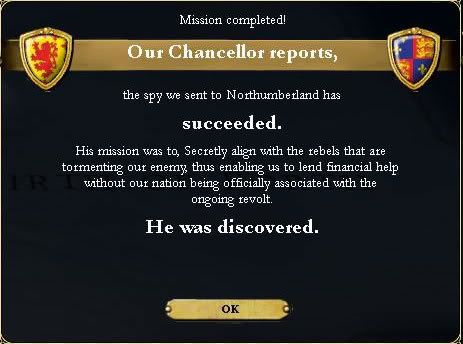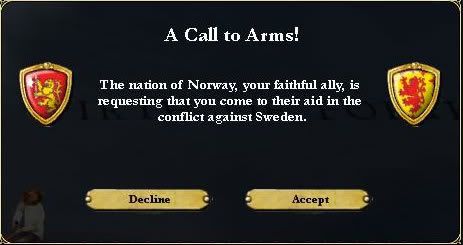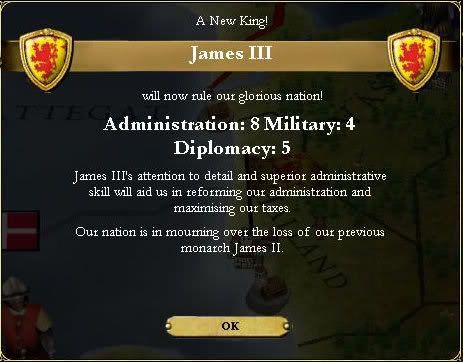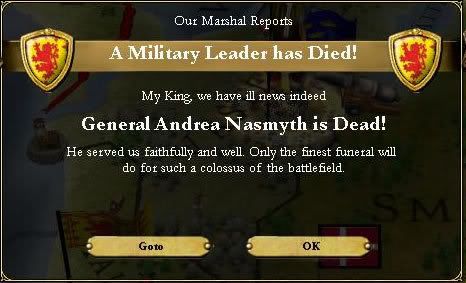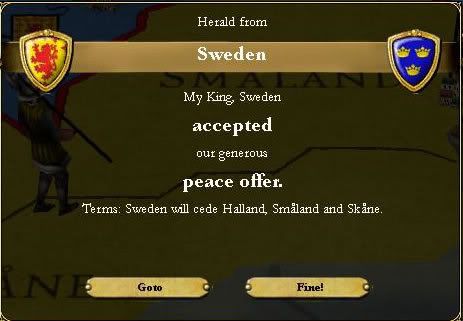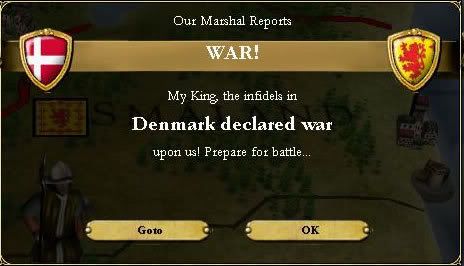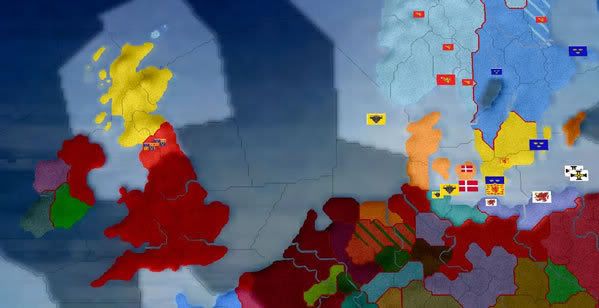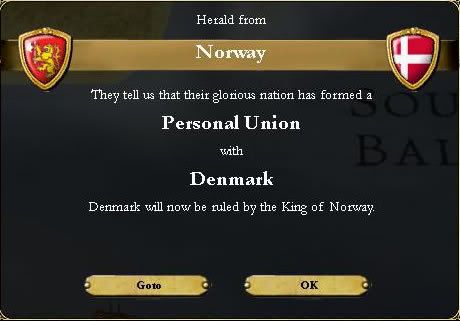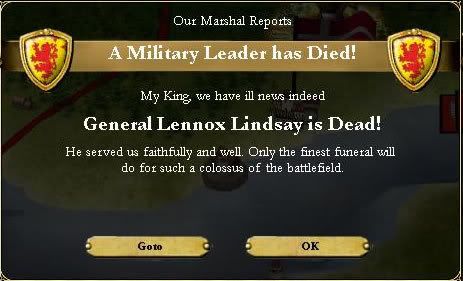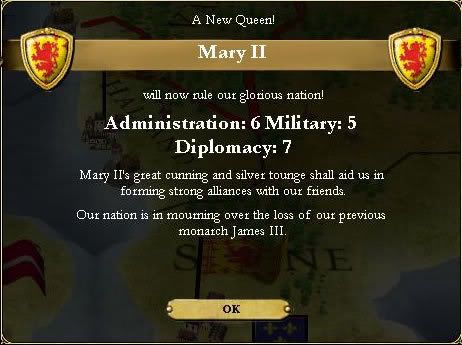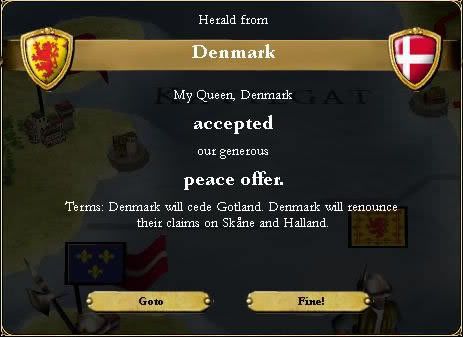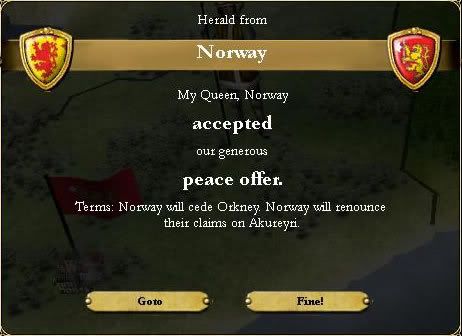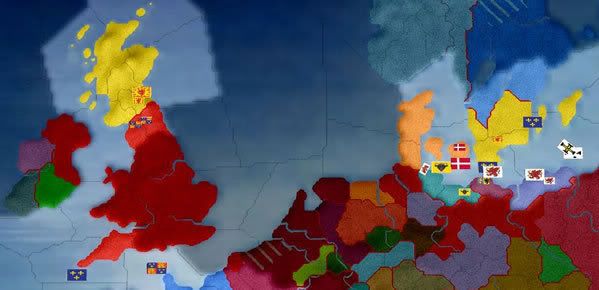Hey guys and welcome to my new AAR. It took a little time to fully decide on what country I would be writing about. My original plan was to write about England, my favorite country in the game. However, after seeing three English AARs, I knew that the last thing the community would want would be another. So where did rational thinking take me? Well obviously, England's enemy: Scotland. 
It has been a long time since I have posted on these forums regulary. I just finished getting my degree in American history and Creative Writing at the University of Iowa, which was the reason I left so long ago (degrees can be tough nuts to crack.) I was excited to get EUIII, and at once began thinking of a storyline for an AAR. As some of the older members might remember, I tend to write in story form. So if you do not like long, drawn out stories about possibly just one minor incident, this might not be the AAR for you. Otherwhise, enjoy.
So some rules, background information, goals and such:
- Starting in 1453 on Normal.
- No Cheating whatsoever (including reloading.)
- Every single army I control will have a general, this includes navies as well. The only time this would not be the case is if it is part of the story line and/or I'm in a pickle of a situation.
- Become Papacy Controller.
- Conquer the English girly-men only by war.
- Control Ireland only by diplomacy since Scotland tended to have good relations with the Irish.
- Once the British Isles is Scotland's, hopefully become Great Britain and lead the glorious nation the Scottish Highlander way.
- In the beginning, recruitment of knights/cavalry will be low since Scotland, historically did not have the resources for such a feat. Basically 1 knight to 8 infantry. That should keep things in perspective and make it a bit harder on me. However, once Scotland conquers England, it's fair game.

Sweat, blood and tears had stained the lands of Scotland as numerous Scotsmen fought for their way of life, the way of the highlander. Battle after battle was raged as good Scots were slaughtered by the overwhelming military might of the English and its King, Edward I. With each defeat, it soon was recognized that the last gasp of hope for freedom was being beaten out of the lungs of brave Scots.
Times were changing though. By 1314, Scotland was no longer gasping for breath. Under the leadership of Robert the Bruce, the Scots were able to take back most of their land and oust the English from their homeland. This was in part due to Robert’s genius and courage, but also due to a timely death. With the death of King Edward I, it would be years before the English would return to Scotland. The fourth son of King Edward I, the prideful Black Prince of Wales, Edward II took the throne and promised to finish what his father started so many years earlier.
Edward II and England had seen better days in Scotland. Castle Stirling, one of the last remaining English strongholds was under siege. Without relief, a major embarrassment would be inflicted on the young King. This in mind, Edward II assembled a massive army of forty thousand professional soldiers, including about twenty-five hundred heavy cavalry. This impressive army bewildered the surrounding populace as it marched towards Stirling and to Bannockburn ford. Robert the Bruce, knowing that Edward II was on his way, sensed that the English King would bring his army through Bannockburn. This was a perfect location to set up a trap, for if successful, the English would not have the room to be able to fight at full force. Robert the Bruce was planning on crowding the English into submission.
Robert’s plan worked perfectly. Two small skirmishes in which much of the English cavalry were destroyed gave the Scots a sense of victory. Demoralized, the English set up camp and waited for the morning to arrive in hope that new found success would find its way to them. On the morning of June 24th, 1314, the proud warriors of Scotland lined up for battle against the oncoming English. Receiving their blessing from the priests, the Scots rose and waited in formation for the English cavalry to charge. After the majority of Edward’s army passed the gorge, the cavalry was unorganized for two commanders argued over who should lead the charge. Even so, the confused cavalry charged the steady and disciplined lines of the Scots. The Scots holding fifteen foot pikes completely decimated the oncoming charge, outright killing numerous knights while others were trampled to death by their own horses. English archers began to fire into the bloody mess of bodies and horses, inflicting losses on the Scots but as well on their own cavalry. Robert the Bruce anticipating the archers ordered the charge of his own cavalry to route them.
Soon, the entire English army was in disarray. Countless English soldiers retreated, running towards the river. With Scottish lines pressing towards the retreating English, hundreds of men were trampled upon, killed by Scottish blades or even drowned in the river. Edward II fled for safety as his last view of Scotland would be from his back. The Battle of Bannockburn was over. For over eighteen years, the Scots fought for independence under their new King. It would be a nobleman named Robert the Bruce that would finally lead Scotland to victory but more importantly, freedom.
Over the next one hundred and forty years, Scotland with its new found independence savored its freedom. A succession of Scottish Kings would rule the land, as Scots continued to defend their freedom from any incursion. With moments of peace, prosperity soon filled the lands as universities were built and towns flourished with trade. The eyes of the world were now fixated on the Scottish Highlands. The coronation of James II at Kelso Abbey on March 24, 1437, would lead to a new chapter of Scottish history. Considered to be one of the wiser kings in recent history, a new dawn was breaking as the King of the Scots eyed what he believed to be his prize and ultimate destiny, England.
It has been a long time since I have posted on these forums regulary. I just finished getting my degree in American history and Creative Writing at the University of Iowa, which was the reason I left so long ago (degrees can be tough nuts to crack.) I was excited to get EUIII, and at once began thinking of a storyline for an AAR. As some of the older members might remember, I tend to write in story form. So if you do not like long, drawn out stories about possibly just one minor incident, this might not be the AAR for you. Otherwhise, enjoy.
So some rules, background information, goals and such:
- Starting in 1453 on Normal.
- No Cheating whatsoever (including reloading.)
- Every single army I control will have a general, this includes navies as well. The only time this would not be the case is if it is part of the story line and/or I'm in a pickle of a situation.
- Become Papacy Controller.
- Conquer the English girly-men only by war.
- Control Ireland only by diplomacy since Scotland tended to have good relations with the Irish.
- Once the British Isles is Scotland's, hopefully become Great Britain and lead the glorious nation the Scottish Highlander way.
- In the beginning, recruitment of knights/cavalry will be low since Scotland, historically did not have the resources for such a feat. Basically 1 knight to 8 infantry. That should keep things in perspective and make it a bit harder on me. However, once Scotland conquers England, it's fair game.

Prologue
Sweat, blood and tears had stained the lands of Scotland as numerous Scotsmen fought for their way of life, the way of the highlander. Battle after battle was raged as good Scots were slaughtered by the overwhelming military might of the English and its King, Edward I. With each defeat, it soon was recognized that the last gasp of hope for freedom was being beaten out of the lungs of brave Scots.
Times were changing though. By 1314, Scotland was no longer gasping for breath. Under the leadership of Robert the Bruce, the Scots were able to take back most of their land and oust the English from their homeland. This was in part due to Robert’s genius and courage, but also due to a timely death. With the death of King Edward I, it would be years before the English would return to Scotland. The fourth son of King Edward I, the prideful Black Prince of Wales, Edward II took the throne and promised to finish what his father started so many years earlier.
Edward II and England had seen better days in Scotland. Castle Stirling, one of the last remaining English strongholds was under siege. Without relief, a major embarrassment would be inflicted on the young King. This in mind, Edward II assembled a massive army of forty thousand professional soldiers, including about twenty-five hundred heavy cavalry. This impressive army bewildered the surrounding populace as it marched towards Stirling and to Bannockburn ford. Robert the Bruce, knowing that Edward II was on his way, sensed that the English King would bring his army through Bannockburn. This was a perfect location to set up a trap, for if successful, the English would not have the room to be able to fight at full force. Robert the Bruce was planning on crowding the English into submission.
Robert’s plan worked perfectly. Two small skirmishes in which much of the English cavalry were destroyed gave the Scots a sense of victory. Demoralized, the English set up camp and waited for the morning to arrive in hope that new found success would find its way to them. On the morning of June 24th, 1314, the proud warriors of Scotland lined up for battle against the oncoming English. Receiving their blessing from the priests, the Scots rose and waited in formation for the English cavalry to charge. After the majority of Edward’s army passed the gorge, the cavalry was unorganized for two commanders argued over who should lead the charge. Even so, the confused cavalry charged the steady and disciplined lines of the Scots. The Scots holding fifteen foot pikes completely decimated the oncoming charge, outright killing numerous knights while others were trampled to death by their own horses. English archers began to fire into the bloody mess of bodies and horses, inflicting losses on the Scots but as well on their own cavalry. Robert the Bruce anticipating the archers ordered the charge of his own cavalry to route them.
Soon, the entire English army was in disarray. Countless English soldiers retreated, running towards the river. With Scottish lines pressing towards the retreating English, hundreds of men were trampled upon, killed by Scottish blades or even drowned in the river. Edward II fled for safety as his last view of Scotland would be from his back. The Battle of Bannockburn was over. For over eighteen years, the Scots fought for independence under their new King. It would be a nobleman named Robert the Bruce that would finally lead Scotland to victory but more importantly, freedom.
Over the next one hundred and forty years, Scotland with its new found independence savored its freedom. A succession of Scottish Kings would rule the land, as Scots continued to defend their freedom from any incursion. With moments of peace, prosperity soon filled the lands as universities were built and towns flourished with trade. The eyes of the world were now fixated on the Scottish Highlands. The coronation of James II at Kelso Abbey on March 24, 1437, would lead to a new chapter of Scottish history. Considered to be one of the wiser kings in recent history, a new dawn was breaking as the King of the Scots eyed what he believed to be his prize and ultimate destiny, England.
Last edited:


